

Top 10 Issues for Project Managers. January 10, 2011 by rkelly976 For this week’s post, I tapped into a dozen project managers representing approximately 150 years of experience with companies such as HP, IBM, Schering-Plough (now Merck), Morgan Stanley, JPMorgan, Lenovo, Siemens & consulting gigs at dozens more.

There has been a lot of discussion on project management in the past year…PMI & APM membership is growing, the US Government has called out project/program management in a 5 part IT Improvement strategy, and so on. With all this focus, I wanted to ask my colleagues what they would tell an aspiring Project Manager or what issues they would like their managers to assist with. My questions to them…”What are those things that frustrate you most about being a Project Manager? What should anyone considering this career path understand first?” The administrative tasks associated with running several projects was overwhelming at first. Scientists: Social Media Is Not Necessarily a Waste of Time. This is how many scientists view social media - pictures of cats on computers.
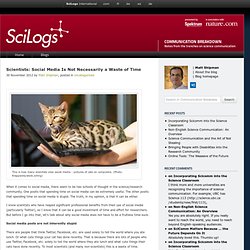
(Photo: Krappweis/stock.xchng) Ciencia20_rebiun. Mark Drapeau: Social Networks for Scientists Won't Work. A "Facebook for Scientists"? It may sound silly, or redundant, but it's becoming more of a reality. Maybe. A new startup based in Germany named ResearchGate has already convinced roughly 1.4 million researchers to become members and begin sharing.
On it, you can search your email accounts to find people you know, read PDF documents of research papers, and chat with others about why a particular lab technique isn't working for you. Reportedly, the service is appealing to young researchers in their 20's. None of this is particularly original. The Economist writes about ResearchGate as if it's the only social network for scientists out there, but that's far from the case. It's not really clear what ResearchGate is doing that's fundamentally different than Labmeeting. It's easy to measure total users or total PDF's uploaded or other metrics and claim some success. This story about Science 2.0 reminds me of a slightly older debate about Intelligence 2.0, whereby the U.S. What Is A Scientific Social Network? 6 Thriving and Inspiring Examples - Comprendia. A recent article from the Huffington Post states that social networks for scientists won’t work because there is no incentive from a career perspective.
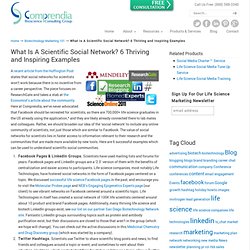
The piece focuses on ResearchGate and takes a stab at the Economist’s article about the community. Here at Comprendia, we’ve never advocated that Facebook should be recreated for scientists, as there are 700,000+ life science graduates in the US already using the application,* and they are likely already connected there to lab mates and colleagues. Rather, we should broaden our idea of the ‘social network’ to include any online community of scientists, not just those which are similar to Facebook. The value of social networks for scientists lies in faster access to information relevant to their research and the communities that are made more available by new tools. Here are 6 successful examples which can be used to understand scientific social communities. Facebook Pages & LinkedIn Groups.
ResearchGate wants academics to be successful by admitting when they’ve failed. If you’re doing everything right, your LinkedIn profile is pristine.
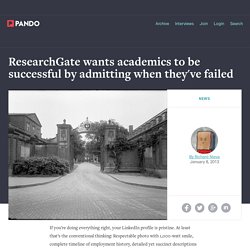
At least that’s the conventional thinking: Respectable photo with 1,000-watt smile, complete timeline of employment history, detailed yet succinct descriptions of duties. It’s the perfect, mistake-free, ever-so-employable version of you. A ResearchGate profile in part now has the opposite goal. It wants members to show how unsuccessful they’ve been in the past.
First, an explanation of ResearchGate: It’s an online network of over 2.3 million academics – doctors, PhDs, scientists – that allows them to connect with one another, usually with the intention of collaborating on and advancing research. But, as indicated, it would be too simplistic to think of it just as a Facebook or LinkedIn for academics. The new profiles contain portals for non-peer reviewed work and supplementary material, which is where the negative results would go. That’s because those are the gems. ‘Open Science’ Challenges Journal Tradition With Web Collaboration. Photo The New England Journal of Medicine marks its 200th anniversary this year with a timeline celebrating the scientific advances first described in its pages: the stethoscope (1816), the use of ether for (1846), and disinfecting hands and instruments before surgery (1867), among others.
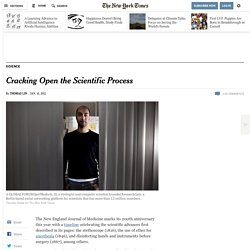
For centuries, this is how science has operated — through research done in private, then submitted to science and medical journals to be reviewed by peers and published for the benefit of other researchers and the public at large. But to many scientists, the longevity of that process is nothing to celebrate. The system is hidebound, expensive and elitist, they say. Peer review can take months, journal subscriptions can be prohibitively costly, and a handful of gatekeepers limit the flow of information.
ResearchGate: A Dynamic Collaborative Network for Scientists and Researchers. Dr.

Ijad Madisch, Founder ResearchGate. Social media tips for scientists : Nature Jobs Blog. For many scientists, the thought of spending time on social media sites is distinctly unappealing.
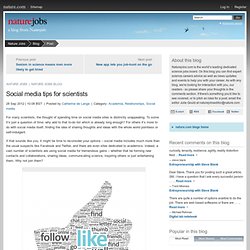
To some it’s just a question of time: why add to that to-do list which is already long enough? For others it’s more to do with social media itself, finding the idea of sharing thoughts and ideas with the whole world pointless or self-indulgent. If that sounds like you, it might be time to reconsider your options – social media includes much more than the usual suspects like Facebook and Twitter, and there are even sites dedicated to academics.